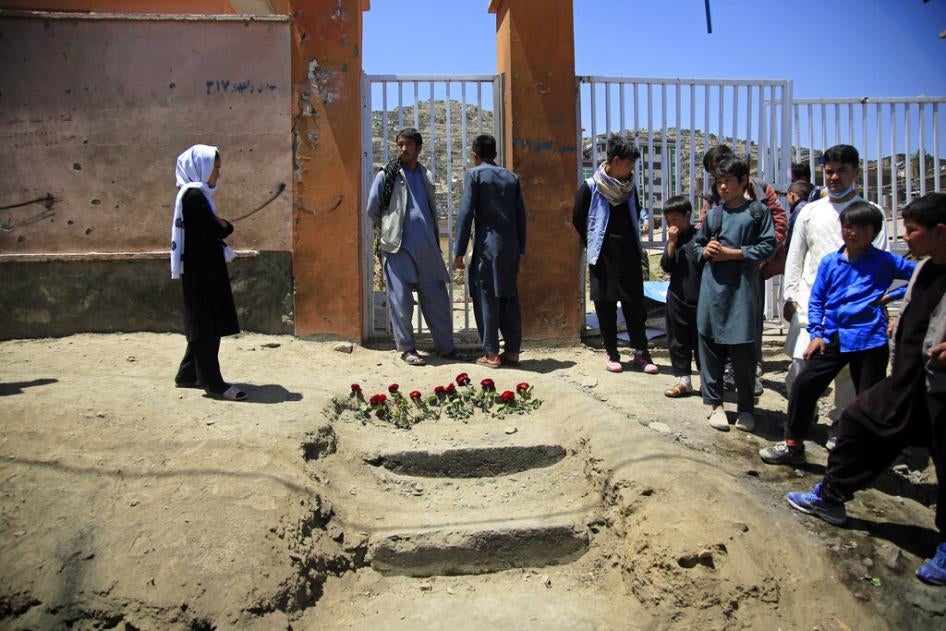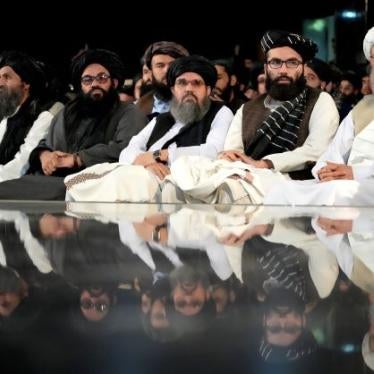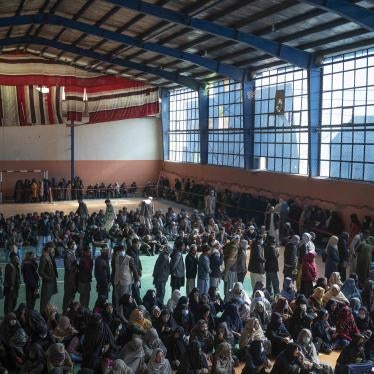(New York) – The Islamic State of Khorasan Province (ISKP), the Islamic State’s (ISIS) affiliate in Afghanistan, has repeatedly attacked Hazaras and other religious minorities at their mosques, schools, and workplaces, Human Rights Watch said today. The Taliban authorities have done little to protect these communities from suicide bombings and other unlawful attacks or to provide necessary medical care and other assistance to victims and their families.
Since the Taliban took over Afghanistan in August 2021, the Islamic State affiliate has claimed responsibility for 13 attacks against Hazaras and has been linked to at least 3 more, killing and injuring at least 700 people. The Taliban’s growing crackdown on the media, especially in the provinces, means additional attacks are likely to have gone unreported. The United Nations Assistance Mission in Afghanistan (UNAMA) reported that recent attacks by the group on Shia gatherings in Kabul killed and injured more than 120 people.
“Since the Taliban takeover, ISIS-linked fighters have committed numerous brutal attacks against members of the Hazara community as they go to school, to work, or to pray, without a serious response from the Taliban authorities,” said Fereshta Abbasi, Afghanistan researcher at Human Rights Watch. “The Taliban have an obligation to protect at-risk communities and assist the victims of attacks and their families.”
The Hazara are a predominantly Shia Muslim ethnic group that have faced discrimination and abuse by successive Afghan governments for over a century. During the 1990s, Taliban forces targeted the Shia for mass killings and other serious abuses. With the Taliban back in power, the Hazara have been increasingly concerned for their safety and whether the new authorities will protect them. “The Taliban never liked Hazaras,” said one Hazara community member in Bamyan province. “Last time they were in power, they killed many of us.”
In October 2021, the Taliban Interior Ministry spokesperson, Saeed Khosty, said that they would ensure security for religious minorities: “As a responsible government, we are responsible for protecting all citizens of Afghanistan, especially the country’s religious minorities.” However, the Taliban do not appear to have provided increased security in Kabul, Mazar-e Sharif, and Kunduz provinces, where attacks have killed hundreds of people since January 2022.
Human Rights Watch remotely interviewed 21 survivors of attacks, and family members of victims, in Kabul and Mazar provinces between April and July, using secure communications.
The Islamic State group claimed responsibility for the April 19 suicide bombing at Abdul Rahim Shahid High School in the west Kabul neighborhood of Dasht-e Barchi – a predominantly Hazara and Shia area – that killed and injured 20 students, teachers, and staff. “There were dead bodies everywhere,” said a survivor. “Bodies were split into pieces, and you could smell blood.”
The group also claimed responsibility for the April 21 suicide bombing of one of Afghanistan’s largest Shia mosques, Seh Dokan Mosque in Mazar-e Sharif, which killed 31 people and wounded 87 others. On April 27, unidentified men killed 5 Hazara men on their way to the Dare-Suf coal mine in Samangan province. The next day, a bomb explosion killed 9 people and wounded 13 others in a minibus carrying Hazara passengers in Mazar-e Sharif.
A Hazara resident of Kabul who had witnessed many previous attacks said: “Our children need to go to school, our women need to visit hospitals, we want to go to mosques. For all these we need to feel safe. For God’s sake, these places cannot be targets – stop killing us everywhere.”
Richard Bennett, the United Nations special rapporteur on human rights in Afghanistan, called on May 26 for investigations into the attacks on Hazara, Shia, and Sufi communities. He said they were “becoming increasingly systematic in nature and reflect elements of an organizational policy, thus bearing hallmarks of crimes against humanity.”
The attacks, beyond their immediate devastation, take a terrible long-term toll on the survivors and families of victims, depriving them of breadwinners, often imposing severe medical burdens, and restricting their access to daily life. “We do not send our children to school anymore, and we close our shops early,” said a man who lost his 45-year-old brother in the Seh Dokan Mosque attack. “The mosque has also been closed since the attack.”
For women, losing a male family member has particularly dire social and economic consequences, especially for young women who are suddenly widowed. Taliban restrictions on women’s rights to work and to move freely have made it impossible for some women to earn a living and become financially independent. Regulations requiring women to be accompanied by a mahram (male blood-relative) while travelling have made it extremely difficult for women to go about everyday tasks and add to the trauma they already face.
“My loved one has passed away,” said a woman who lost her husband in a magnetic bomb explosion in Dasht-e Barchi in Kabul soon after the Taliban takeover. “Even though I have a degree, it’s now hard for women to find employment and establish financial independence under the Taliban.”
Most of those whom Human Rights Watch interviewed also said they experienced depression and severe trauma as a result of the attacks.
Attacks on Hazara and other religious minorities by the Islamic State of Khorasan Province violate international humanitarian law, which remains applicable in Afghanistan. Deliberate attacks on civilians are war crimes. Beyond the immediate loss of life, such attacks cause long-term economic hardship, incur lasting damage to physical and mental health, and result in new barriers to education and public life.
The Taliban’s failure to provide security to at-risk populations and medical and other assistance to survivors and affected families, as well as Taliban policies that violate human rights, particularly those of women and girls, exacerbates the harm these attacks cause.
“Armed group leaders may one day face justice for their atrocities against Hazaras and other communities,” Abbasi said. “Taliban officials who fail to take action to protect religious minorities from attack may be complicit in these grave crimes.”
For detailed findings, please see below.
Personal names used below are pseudonyms to protect the security of interviewees.
Long-term Impact of Attacks on Lives and Livelihoods
Families of victims of attacks described their grief over the loss of their family members and their worries about feeding their children and themselves. When primary breadwinners were killed, as in the majority of cases investigated, the surviving relatives, especially women, suffered particular hardship under Taliban rule. Most of the families said that they had received little or no support from the Taliban authorities.
Faeza, whose husband was killed in the Seh Dokan Mosque attack, said:
I am left with seven children. I used to work as a cleaner to support my husband with living expenses, but since the Taliban took over, that’s not possible anymore. I don’t have any other skills, and even if I did, I still couldn’t work. The Taliban do not allow women to work in most professions anymore. Our neighbor, who used to be a teacher, now does housework. It’s very difficult to even imagine feeding seven children while there are no resources or job opportunities available.
Naeem, 27, who lives near the Seh Dokan Mosque and saw the explosion, said he no longer feels safe visiting mosques. “I have sworn to my mother that I will never go to any mosque in order to protect myself from an explosion.”
Gul Ahmad, 42, who was killed in the Seh Dokan Mosque bombing, had five children, all under 18. Without a breadwinner in the family, his 15-year-old son left school to work. “We are living in a nightmare, with no support, with him gone, nothing is left for us now," Ahmad’s wife said.
Sher Mohammad, 53, who was also killed in the mosque bombing, had been running a small business in Mazar-e Sharif. He had worked hard to make sure that all of his children could get an education, but since his death, they have not been able to attend school or take courses. The family can barely afford to buy food or clothes. “We must continue to live with this pain," his wife said.
The Taliban authorities provided each of the families 100,000 afghanis (US$1,100) when they collected their husbands’ bodies from the hospital. That money was no replacement for long-term assistance the families need. “Now with no hope for the future, most of the days we don’t eat,” Ahmad’s wife said. “That’s our new life.”
One family from Mazar-e Sharif lost three members: Rahmatullah, 40; Asadullah, his 15-year-old son; and Mohammad Ali, a 24-year-old nephew who had travelled from Daikundi, in central Afghanistan, to study for the university entrance exam. All three were killed while praying at the Seh Dokan Mosque. Now the family of five lacks a breadwinner. “How would you have felt if you had come across three dead bodies in front of a house?” said Rahmatullah’s niece. “Everyone in the neighborhood was stunned and mute. The situation was awful and shocking.”
The blast at Abdul Rahim Shaheed High School on April 19 was at the school gate, between 9:45 and 9:55 a.m., when 12th grade students were leaving to head home. The 20 people killed or injured were between ages 16 and 53.
Sayed Muhammad Hussain, 53, a local resident, heard an explosion and rushed to help the victims. A second explosion, 30 minutes later, killed him instantly. His son helped injured students but did not know until later that his father was among the victims. “I was one of the first few people who arrived to help,” Hussain’s son said. “I carried the bodies. Seven students and two local residents were killed, but I didn't know one of them was my father.”
Hussain had eight children, six girls and two boys. He was the family’s breadwinner, and after his death, his oldest son, 22, became responsible for everyone.
Impact on Physical and Mental Health
Many of the hundreds wounded in the attacks in the past year have suffered serious injuries, and not all will recover fully. The previous Afghan government provided financial assistance to those injured in attacks by insurgents and to family members of those killed. The survivors and families of victims of the recent attacks said they were not aware of any Taliban guidelines for financial support or setting the amount to be provided.
The explosion at Abdul Rahim Shahid High School shattered the kitchen windows in a nearby home. It damaged the hearing of Safia, 16, who was in the kitchen, and she can no longer speak. Her father, a daily wage worker, earns about 250 afghanis ($3) per day; they cannot afford medical treatment. Several Taliban officials visited their home, but they did not provide any financial assistance.
Basir Ahmad, 28, an information technology technician, said his arms were injured in the Seh Dokan Mosque bombing. “I don't think I’ll ever be able to set internet lines with these arms,” he said. “My job needs me to scale tall structures. I don’t have strength in my arms.” He also described being traumatized. “Everywhere I go, I believe that an explosion is happening. I relive that nightmare every day.”
Sayed Mohammad, 27, who had left his university a few years earlier out of fear of an attack, was among those killed in the explosion at the Seh Dokan Mosque. His father said that his fiancé, Masooma, was in shock and did not eat, drink, or sleep much. Mohammad’s mother said that she had been experiencing anxiety and insomnia, and medication prescribed by two doctors had not helped.
Ahmad Shah, 22, was wounded in the Seh Dokan Mosque bombing, which killed his 50-year-old father. The explosion injured his left arm, leaving him unable to work. Doctors advised him to travel to India for additional care, but he could not afford it.
Mohammad, a student who loved playing football, suffered serious injuries during the April attack on the Mumtaz Educational Center that left him unable to walk. His family cannot pay for him to travel to India or Pakistan for the specialized medical care that doctors say he requires to fully recover. “I saw the man who exploded himself,” Mohammad said. “A few days before the explosion, he visited our center and registered himself as a student.” Mohammad said that he keeps picturing the bomber’s face.
Zaman, 17, was injured in the attack on Abdul Rahim Shahid High School. The Taliban authorities provided him 5,000 afghanis ($55), but he cannot hear well enough without further treatment to return to school.
Effects of Attacks on Basic Rights and Freedoms
The attacks have made it difficult, if not impossible, for Hazara and Shia community members to exercise their rights to education, to practice their religion, and to other fundamental freedoms. Many found it difficult to get health care and say they don’t feel safe going out in public. They now avoid social gatherings, public transportation, and other public places.
The Seh Dokan Mosque in Mazar-e Sharif shut down after it was attacked. Many families also said that it was safer for their children to stay at home rather than risk being targeted at school.
Sayera, a Kabul resident with four sons, said she has stopped sending her boys to school or elsewhere. She and her husband no longer attend religious services unless absolutely necessary.
Injured students have also been unable to return to schools because of inadequate medical care. Ali Reza, 18, a senior at Abdul Rahim Shahid High School, has been unable to attend class because of injuries to his legs and ears. Several other students said they no longer go to school, fearing for their safety. “Most of my classmates have stopped attending school after the tragedy,” Reza said. “When the Taliban took power, instead of a class of 50, there were only 25. Now, only 10 to 15 kids are currently attending courses as a result of the recent attack on our institution.”
Mohammad Hakim, Ali Reza's classmate, said: “If I am supposed to die, I will die, but so long as I am alive, I will go to school.” But the bullet fragments in his feet have made it difficult for him to walk even short distances. He is hoping that his wounds will heal, and that he will be able to walk again and go back to school.
Recommendations
- The Islamic State of Khorasan Province and other armed groups should fully comply with international humanitarian law, and cease all attacks against civilians and punish commanders responsible for serious abuses.
- The Taliban should fully comply with international humanitarian law, and appropriately prosecute those responsible for grave abuses.
- The Taliban authorities should protect at-risk minorities, including the Hazara and Shia, and ensure their rights to access education and worship without fear.
- The Taliban should consult with communities at risk and civil society groups to protect civilian institutions vulnerable to attack, including schools, hospitals, places of worship, and other community institutions.
- The Taliban should ensure adequate support for emergency health care, such as ambulance services and psychosocial (mental health) support.
- The Taliban should provide financial support to survivors of attacks and family members, with a particular focus on assisting families that have lost a wage earner, including women-headed households, and should issue guidelines for providing that support.
- The Taliban should end all violations of the rights of women, including those that make it more difficult to earn a living.
- The Taliban should ensure adequate support for mental health services and psychosocial support for survivors and witnesses of attacks.
- The Taliban should ensure that children who have disabilities resulting from attacks should be able to go to school on an equal basis with others.
- Governments engaging with the Taliban should call for better protection of Hazara and Shia communities and should encourage and support mechanisms to strengthen accountability for crimes committed in Afghanistan, including against the Hazara and Shia communities.
- All governments should suspend forcible returns to Afghanistan and should look favorably on applications for asylum, and other forms of international protection, for the Hazara and other persecuted ethnic and religious minorities in Afghanistan.









